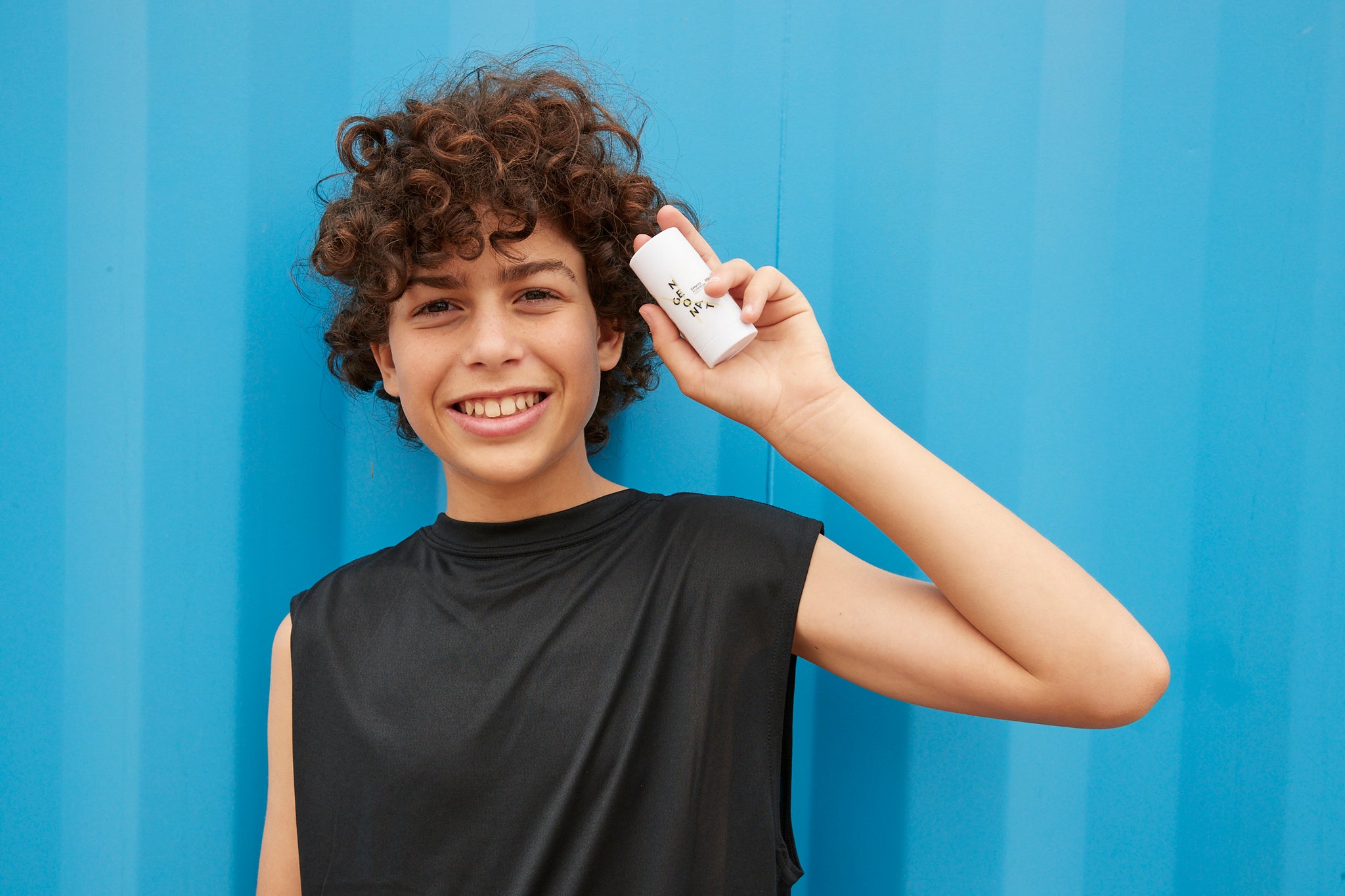
WHAT THE SHVITZ?
WEDS 09 AUGUST 2023, WRITTEN BY JACKIE BARON

So your son has just come back from afternoon footy training. A friend gave him a lift home. He grunts and then shoves past you in the corridor with his school bag, his footy bag and… whoooaaaahhhh!
What was that smell as you stop dead in your tracks? He’s only 10 years old. But now you’re frozen, realising he’s just driven in someone ELSE'S car….smelling like THAT! You are mortified! You literally can’t move an inch yet he has absolutely no idea the stench that is wafting around his little body.
For me, both my sons were actually about ten years old. But we all know this age can range from 8 years when that putrid waft of body odour begins to linger and linger until you realise something must be done. In those early years, often not even a little hair under his cute little arm pit but boy oh boy… the B.O!
Welcome to adolescence! One of the first and definitely for most of us the most noticeable changes experienced by young boys (and their parents!) during this period is an increase in sweating and the development of body odor. While it may be concerning for both boys (bizarre how they are often not too concerned!) and their parents (definitely most of us parents!), these changes are a natural part of growing up. And important to realise that sweating or shvitzing - is natural and important.
So let’s explore the reasons behind why young boys start to sweat and develop B.O and offer some helpful tips to manage these changes. Let’s open the dialogue “What the shvitz?!”. Afterall, if it’s normal and healthy - why still the stigma around B.O? Let’s chat about it with our sons, with our girlfriends, our partners - with whoever!
So why the shvitz?
1. Hormonal Changes
During puberty, the body undergoes significant hormonal fluctuations, with the most notable hormone being testosterone. Testosterone is responsible for the development of masculine characteristics, including the growth of facial and body hair, deepening of the voice, and increased muscle mass. But these changes often happen later than the initial waft of BO…however testosterone also stimulates the sweat glands and yes this is what leads to increased sweating. In actual fact, it is the combination of sweat and bacteria on the skin's surface that contributes to body odor.
Despite thinking our tweens or young tweens are not maturing (!) - I can guarantee you that their Sweat Glands are!!! Sweat glands play a vital role in regulating body temperature. As boys go through puberty, their sweat glands become more active and produce increased amounts of sweat. We actually need to communicate this to them. It is normal. Their bodies are adjusting and regulating and it’s actually very healthy for the body to sweat. There are Eccrine sweat glands, found all over the body, that produce odorless sweat composed primarily of water and salt. However, the sweat released by apocrine sweat glands, located in the armpits and groin area, contains proteins and fats that bacteria feed on, leading to the characteristic body odor - B.O.
CAN'T DENY THE ODOUR

2. Personal Hygiene
The onset of body odor is a sign that it's time to pay closer attention to personal hygiene. Teaching our boys the importance of regular bathing or showering with antibacterial soap helps remove sweat and bacteria from the skin's surface, reducing body odor. Emphasise the need to thoroughly clean areas like armpits and groin where apocrine sweat glands are more concentrated (and no they won’t be interested in the term apocrine sweat gland!). This is the dialogue that once again we need to open up with our sons. It may seem obvious and yes we often find ourselves repeating ourselves. And yes this is definitely the stage when boys don’t want their mums or dads hanging around when they’re in the shower! But simply checking that they are actually using the soap (we have bought for them!) and that they shower in the morning and before bedtime might seem unnecessary, but it is actually very necessary!
3. Clothing and Fabrics
Again this seems to be the stage where mum and dad have less and less influence on our sons clothing choices. However, the choice of clothing can also influence body odor. Synthetic fabrics tend to trap sweat and prevent evaporation, creating an ideal environment for bacteria to thrive. What we should be trying to do is encourage boys to wear breathable, natural fibers like cotton, which allow air circulation and aid in sweat evaporation, reducing B.O. Additionally, wearing clean clothes each day helps minimize bacterial growth. Again it may appear like a basic suggestion to wear a clean T-shirt, but they will grab that T-shirt again despite wearing it all day yesterday if it’s easily accessible! Further, encouraging a healthy diet rich in fruits, vegetables, and whole grains and drinking plenty of water helps flush out toxins, dilutes sweat, and keeps the body hydrated, also minimizing odor.
4. Using Natural Deodorants
Deodorants help mask the body odour by neutralising bacteria whilst often adding a pleasant fragrance. It's important to choose products specifically designed for young boys and educate them on proper application. This would include applying a natural deodorant perhaps a few times within a day (especially for those boys engaged in sports during and after school). Again the emphasis should be that sweating is natural and a sign that our bodies are functioning. The onset of sweating and body odor in young boys is a normal part of their development during puberty. Understanding the physiological changes and providing guidance on personal hygiene practices can help them navigate this transition with confidence. Regardless, no one likes the lingering of B.O which is why products like our Neon Goat Shvitz Stick and Shvitz Spritz can help our boys during these teenage years and beyond.
So let’s remember, it is essential to foster an open and supportive environment to address any concerns they may have, ensuring they feel comfortable and informed during this transformative stage of their lives and let’s keep talking about the shvitz!



